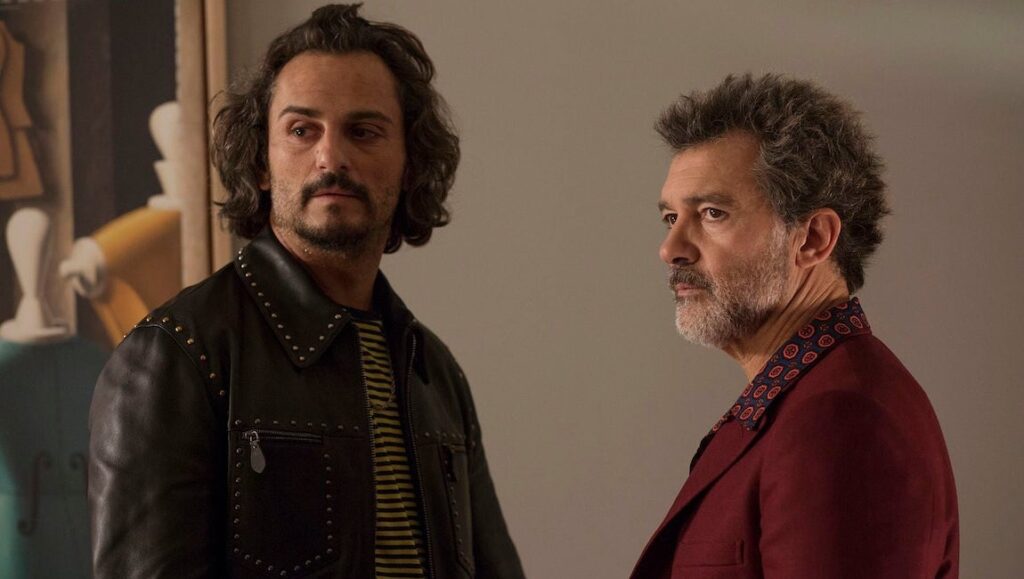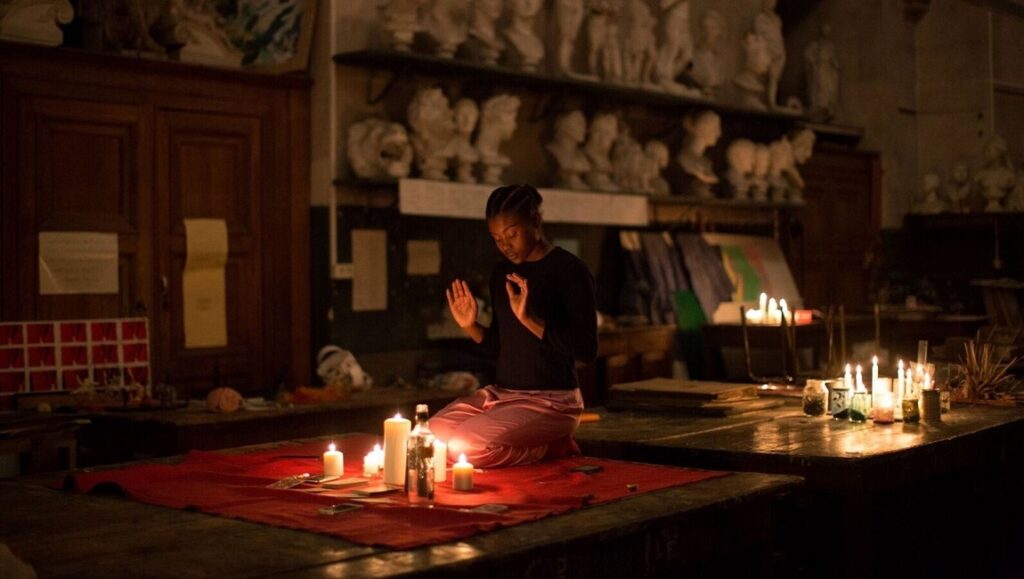Our second dispatch from the 2019 New York Film Festival is heavy on prestige arthouse fare from early-year festivals, and also takes on a timely documentary premiering at NYFF. Below are our takes on a trio of Cannes holdovers, all courtesy of distinctive auteurs, currently making their way through North American fests — Pedro Almodovar’s Pain and Glory, Marco Bellocchio’s The Traitor, and Bertrand Bonello’s Zombi Child. Also here is our look at Berlinale favorite Synonyms, rising Uruguayan director Federico Veiroj’s The Moneychanger (fresh off a Platform slot at TIFF), and thoughts on world premiere documentary Born to Be. Check back next week for the final of our three NYFF dispatches, and, again, make sure to visit our recent Toronto Film Festival coverage and ongoing London Film Festival coverage for takes on the many NYFF films we’re written on elsewhere.
Synonyms
Synonyms is a film driven by an idea, one that rattles around in its protagonist’s head and belabors him at every step. The question is one of personhood and its creation through language — whether one’s nationality is something malleable or, at most, a lie that a citizen can either accept or reject. Taking a number of cues from director Nadav Lapid’s experiences in Paris after his own departure from Israel, Synonyms follows Yoav, a young Israeli running away from his country and its history, as he attempts to find stable footing in Paris. After a symbolic rebirth wherein Yoav finds his personal property stolen and spends the night naked in a bathtub, a young, rich couple offer him clothes and money so that he can start anew in la Ville des Lumières with his adopted language. Both the structure of the story and the oft-disorienting camerawork convey an implacable feeling of alienation, reflected not only through Yoav’s increasingly frustrated mental state, but also the gauntlet his body is run through for the sake of money. He’s told that to give up his language is to lose a part of his person, but this is exactly what he wants. Indeed, if Hebrew is directly associated with any images here, they can be found in the scenes where Yoav interacts with his co-workers on the security detail for the Israeli embassy. Upon starting there, he’s told to watch for minorities and to profile Arabs, thereby infecting his new life with the culture of hypermasculinity and Israeli militarism he’d hoped to rid himself of. One of the most harrowing sequences features Yoav’s colleague, Yaron, storming around on the subway aggressively humming the Israeli national anthem in everyone’s face. He singles out a middle-aged Arab, which here suggests that his violence exists in a predetermined matrix, where the historical conflicts of one’s people are forced onto the individual, thus consigning them to the cycles of discord that plague modern Europe. And here rests the film’s pessimism: Yoav is certainly not free from this; his mother’s father committed acts of terror against British presence in Palestine. And so, as Lapid has said in an interview, “the political, the physical, and even the sexual merge in the clearest way,” dooming Yoav’s body to the fatalism of a conflict perpetuated by a reluctance to speak in the language of another. Sam Redfern
Pain and Glory
With Pain and Glory, Pedro Almodóvar has made his own 8½, seamlessly melding autobiography and fiction here to the point where they’re nearly indistinguishable. Even though the protagonist is a film director named Salvador Mallo (Antonio Banderas) who’s modeled on Almodóvar himself, this comes across not as a narcissistic indulgence, but as a profound demonstration of how real life is both reflected in, and transformed by, artistic creation. Salvador’s voiceover informs us about the multiple chronic ailments he suffers from: debilitating back pain, migraines, tinnitus, anxiety, panic attacks. These health problems, along with an ongoing creative blockage, have effectively halted his filmmaking career, and he despairs that in the absence of artistic work, his life has no meaning. However, Salvador sticks around long enough to be honored by the Madrid cinematheque with a 30th anniversary screening of a restored print of Sabor, a key film of Salvador’s oeuvre. The lead actor of that film, Alberto Crespo (Asier Etxeandia), is also still around, but hasn’t spoken to Salvador in ages, after a falling out between the two over Salvador’s public criticism of Alberto’s performance in that film. Salvador’s been asked to present the film, and because he’s too nervous to do it alone, he looks up Alberto to make amends and ask him to join him for a Q&A. Alberto gives Salvador a hard time at first, but eventually agrees. Alberto has become a raging heroin addict in the years since he acted for Salvador, who impulsively joins Alberto in “chasing the dragon,” even though he’s never touched the stuff before. The heroin, besides easing, or perhaps merely distracting him from his pain, takes him on trips through his memories: He revisits scenes from his childhood, featuring his mother (played in those years by a luminous Penelope Cruz) and a handsome young laborer he taught to read, the source of his first stirrings of homoerotic desire. The past connects to the present, as Salvador reconnects with key figures from his past. One of these meetings, with an old lover, occasions what is perhaps the loveliest, saddest, and most tender passages in all of Almodóvar’s oeuvre. This scene is the major highlight of a film in which Almodóvar fruitfully mines his life and art — echoes of his previous films reverberate throughout — to create one of his very finest works. Christopher Bourne
The Moneychanger
Federico Veiroj’s The Moneychanger is a mess — an overly familiar rise-and-fall narrative that’s been stripped of all meaningful detail and specificity, with a sketchy character study nestled in the center. It is, perversely, a study of an unrepentant loser, a mook, a moocher who stumbles ass-backwards into success thanks to a rigged system. It’s a fairly rote rebuke of capitalism, and an amusing take down of mediocre male privilege, here detailed in the story of Humberto Brause (played with an unfailing devotion to looking ridiculous by Daniel Hendler), who, over the course of two decades, becomes the de facto head of money laundering operations for most of southern Latin America. After a ridiculous introduction, where Brause (who narrates most of the film) declares money “the root of all evil” over a scene of Jesus of Nazareth flipping over banker’s tables, Veiroj attempts to walk a fine line between documentation and absurdity, like mixing Goodfellas with Syriana and Buñuel. He’s not particularly successful at it. There’s a disconnect between the relatively staid visuals and Hendler’s loopy, goofball demeanor. The actor gets a lot of comedic mileage out of a ridiculous mustache and a droopy hound-dog face, but he never convinces as someone who could accomplish what his character supposedly does. Starting in the 1950s as a young apprentice, Brause begins his wayward journey by handling money for corrupt politicians that his boss won’t touch. He gets busted and goes to jail, but the film skips over most of this. Brause gets out and almost immediately starts breaking the law again. In showing dealings with various shady characters in Brazil and Argentina, Veiroj flirts with a whole lot of geopolitical history, invoking the specter of U.S.-funded dirty wars and violent regime change all over the continent. Like most everything else in the movie, this stuff exists mostly in the margins; Veiroj never gets into the nitty-gritty details of how these dealings would actually work. Like Brause’s marriage and children, everything becomes a stripped down plot point, a narrative cog, something to get Brause from point A to point B and create conflict. Ultimately, Veiroj can’t seem to reconcile the main contradiction here: that Brause is a coward and a simpleton who somehow becomes massively successful through currency manipulation and a willingness to make deals with all sorts of unsavory types. That contradiction is clearly part of the point, and the basis for much of the film’s dry comedy, but by making Brause a mostly passive observer, Veiroj also seems to be letting him — and by extension the audience — off the hook. Daniel Gorman
Zombi Child
Voodoo, as represented in Zombi Child, is a religion of opposing functions that ties together life and death in a volatile form of spirituality, though it isn’t until the film’s conclusion that this becomes clear to us. Its narrative proceeds by juxtaposing two stories, different in their temporal and geographical setting but which (superficially) unify to present life and death as brought about through the practices of voodoo. One takes place in Haiti in 1962 with the funeral of a man named Clairvius who soon rises again through the power of voodoo to become a zombie, forced to work in the fields even past his death with no mind to give him autonomy. The second situates us in the company of a girl’s sorority at a prestigious all-girls school; one of the members, Fanny, befriends a Haitian girl, Mélissa, who lost her parents in the 2010 earthquake and invites her into their group, soon becoming aware of her connection to the alien religion of voodoo. Until the denouement, we’re necessarily limited in our perspective because of our being tied to the conception of voodoo contrived by the European girls’ brief internet searches. Director Bertrand Bonello builds tension in this sense by framing Mélissa as a possible threat; indeed, her otherness and connection to the terrifying representations of zombies the girls have seen suggests an antagonism which finds its way into her own perspective, comporting to her European friends’ fears of her and, in a brief daydream, assuming the role of zombie to take a bite out of her friend’s cheek. This can be considered problematic in its reduction of cultural differences to a method of trite tension-building, but it does open up into a slightly more nuanced understanding of voodoo – albeit one where ‘zombies’ are always questionably foregrounded. Once Mélissa’s aunt, Katy, is introduced we’re informed of voodoo’s purpose beyond the creation of zombies, learning of its communal aspect and ability to allow the living to interact with deceased friends and family, yet Fanny forces her own relatively trivial problems upon Katy to make clear the metaphorical underpinnings of her role: that respect is not something this European is capable of in her dealings with the otherized religion of voodoo. Here, the Haitian story takes better shape, tying together Clairvius’ journey from a victim of voodoo to his eventual emancipation, concluding in a place quite different from the present-day story where Fanny’s folly inadvertently condemns Katy to the supernatural consequences of the religion. It’s obvious that Bonello has a clear conception of the social commentary at work here, but the connection between his parallel stories remains spurious and his need for tension reduces the effect of any cogent statement one can parse out. Sam Redfern
The Traitor
A biopic of Mafia boss Tommaso Buscetta (played splendidly by Pierfrancesco Favino) — nicknamed “the boss of two worlds” for being a snitch for the Italian government, in one of the country’s largest mafia trials — Marco Bellocchio’s The Traitor attempts to understand the psychology of a betrayal. Buscetta went against La Cosa Nostra (as the mafia is called here), in part because he felt the organization had moved its moral compass, getting involved in the drug trade and dispensing with anyone who got in their way. While it’s understood that Buscetta was largely forced into the role of informer — we see a gruesome sequence in which the Brazilian police threw his then wife from a helicopter right before his eyes — his experience within the organization influences his decision to turn. Even as the former mobster throws everyone he knows under the bus, however, he’s also wracked by remorse. This is especially evident during Buscetta’s courtroom confrontation of Pippo Calò (Fabrizio Ferracane), a supposed friend of Buscetta’s since childhood, but who later kills two of his sons. As the saying goes, familiarity breeds contempt — and that’s an expression that might also be applied to the experience of watching this film. Two familiar genre frameworks inform how The Traitor unfolds: the biopic and the mob movie. And, to be sure, Bellocchio frequently adheres to formula. But he also displays a disarming compassion for everyone involved. We’ve seen snitches in court scenes numerous times before; less common are scenes like the one in this film, in which Buscetta processes his willingness to personally forgive someone who’s killed members of his family, but remains committed to seeing them serve time for their crimes. The Traitor relies on the complexity of this central struggle, and especially on Favino’s performance — the way the conflict on his rugged face translates into our own conflicted feelings about how to view the character. Jaime Grijalba Gomez
Born to Be
Born to Be, directed by Tania Cypriano, takes as its subject New York’s Mount Sinai Hospital and the multitude of stories belonging to the transgender patients currently going through some form of surgical transition. Given the creation of new methods and procedures, this film has been released at a significant time in the history and development of trans medicine. Comprised of footage taken at the hospital — meetings, check-ups, and the moments before and after surgeries — Born to Be focuses largely on the work of Dr. Jess Ting and his interactions with his patients. In addition to this, we’re shown a number of more intimate explorations detailing the lives — past and present — of those transitioning, which helps weave together their experiences with the intricacies of pioneering new medical procedures. At the moment, access to the care seen throughout this film is limited and subject to a large waiting line, so one of its central tensions is the great stress placed upon both staff and prospective patients because of their knowledge of the urgent nature of the hospital’s work. Dr. Ting’s role in the film occasionally slips over into a ‘great man’ portrait which is understandable for a person whose labor proves beneficial for so many. And yet, given his relative distance from the lived experience of his patients, there’s a risk in having him mediate an exploration of this subject. If there is one major issue, it’s that the film hampers its own ability to convey the protracted struggle that people transitioning face, treating them more as subjects than as partners in the creation of this documentary. Contextual information often adheres to a reductive desire for brevity and even the mention of one patient’s suicide attempt comes as a surprise simply because her struggle has been so flimsily drawn. Born to Be is at its best when the voices of its subject serve not only to edify but also to help the audience gain an understanding of the procedures of those transitioning. As such, the film can be taken as a testament to medical progress — and a successful one, too. But it delivers on as many fronts as it misses, leaving viewers with the impression that there’s much more that needs to be said. Sam Redfern





Comments are closed.